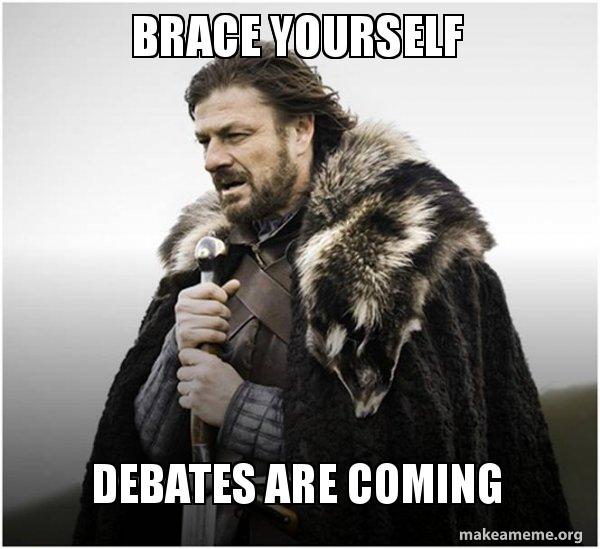Supporting Graduate Students' Academic and Professional Success

What do we teach students about life when they are asked to discuss rather than debate a topic? Before I dive into this perhaps philosophical, rather than practical question, it may be appropriate to explain how we are currently emphasizing discussion in the classroom and minimizing debate. I hope that by the end of my musings I can convince you to make simple rhetorically changes in your classroom that will help promote student learning.
[Image Description: Ned Stark, from Game of Thrones, holding a sword and looking off into the distance. Above and below him are the words: Brace yourself, discussion is coming.]
Pictured: You, getting ready for class discussion
Many pedagogical texts suggest techniques to promote student discussion. These techniques, including Think-Pair-Share, small group discussion of topics, gallery walks, and many more, are meant to lower barriers to students sharing their ideas. One common theme across all of these strategies is that they are designed to begin a conversation about a piece of material. I love these student discussions and they have often led to very interesting conversations. However, these conversations, while interesting, may not cause students to form opinions backed by evidence. Think back to the type of answers you often receive after you have set aside time for discussion. What type of responses did students have prepared and at what level of learning were these answers indicative of? In my experience, these answers simply restate what students remember about a topic or offer an attempt to understand the topic in question. How can we help students move beyond this level of learning and does simple discussion promote active learning or just the motions of active learning?
Debate is a powerful tool that can be used to arrive at the correct or “best” answer. The process of a debate mirrors that of scientific enterprises as we ask students to use inductive and deductive reasoning to craft logical arguments in order to reach a conclusion. An important point to remember, especially in an election year, is that debates are meant to bring about agreement through the process of civil disagreement. There often is no winner, as the best answers and solutions come about through the integration of opponents’ arguments. This process occurs in the sciences at much longer time scales and can be demonstrated using the acceptance of Darwin’s theory of evolution over that of Lamarck. I think Bret Stephens gave a great description of how discourse in debate helps us to better understand our own thoughts and opinions.
“To disagree well you must first understand well. You have to read deeply, listen carefully, watch closely. You need to grant your adversary moral respect; give him the intellectual benefit of doubt; have sympathy for his motives and participate empathically with his line of reasoning. And you need to allow for the possibility that you might yet be persuaded of what he has to say.” -Bret Stephens 2
Debate or any arena in which you must prepare both an argument for why you are right and be prepared to be proven wrong, helps us to be ready to engage with new material and reevaluate what we believe in.
[Image Description: Umma, from Kim's Convenience, looks at the screen while raising her eyebrows and says, "Yeah...did you know?"]
Pictured: Your internal voice, helping to prep you for a debate
Now that I have discussed how I view discussion vs. debate in the classroom I will bring up a fun fact.
Did you know that if you ask, “What are your questions?” rather than “Do you have any questions?” it is a great way to get students to ask questions in the classroom? Using the same psychological trick, I think a simple change to help students can be trading out the word discuss for debate. I think this rhetorical device will be even more effective when we discuss with students what debate is, how it is beneficial, and why much of what is modeled as debate online and in the media may be more accurately described as two people closing their eyes, putting their fingers in their ears, and shouting lalalalalala at one another until an event ends.
I believe that both discussion and debate are important tools for the educator to have in their toolkit. This doesn’t mean that we shouldn’t be intentional about how these strategies differ and make sure we choose the right tool for the right time. I have started to reframe small group time when appropriate to have students come up with points for debate and am excited to see how this small change may make a big difference when I am teaching.
Some helpful links:
- The Big List of Class Discussion Strategies
- The Dying Art of Disagreement
- Debates

